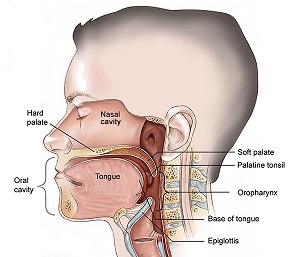Cancer News: John Hopkins Study Shows That The More Oral Sex One Indulges In, The Higher The Risks Of Developing Oropharyngeal Cancer
Source: Cancer News Feb 01, 2021 5 years, 1 week, 6 days, 17 hours, 31 minutes ago
Cancer News: A new study by researchers from John Hopkins’ Kimmel Cancer Center shows that frequency of oral sex along with number of sex partners one has are all contributing factors to increasing one’s risk of developing propharyngeal cancer.

The study showed that a wide breadth of behaviors surrounding oral sex may affect the risk of oral HPV infection and of a virus-associated head and neck cancer that can be spread through this route.
These study findings add nuance to the connection between oral sex and
oropharyngeal cancer ie tumors that occur in the mouth and throat and could help inform research and public health efforts aimed at preventing this disease.
The study findings were published in the peer-reviewed journal: Cancer.
https://acsjournals.onlinelibrary.wiley.com/doi/epdf/10.1002/cncr.33346
It was reported that in the early 1980s,scientists realized that nearly all cervical cancer is caused by the human papillomavirus (HPV), a DNA virus from the Papillomaviridae family.
Though about 90% of HPV infections cause no symptoms and resolve within two years, a minority of people retain the virus, which can damage DNA and trigger malignancies.
After nearly two decades after uncovering this link, scientists discovered that a growing number of oropharyngeal cancers are also caused by HPV. Now, the majority of oropharyngeal cancers are HPV-related.
Past research suggested that the higher a person's number of oral sex partners over a lifetime, the greater their risk of HPV-related oropharyngeal cancer.
But, says Dr Virginia Drake, M.D., first author of the study and a surgical resident at the Johns Hopkins Kimmel Cancer Center, little was known about what other risk factors might contribute to this disease.
Dr Virginia Drake, M.D., the study’s first author and a surgical resident at Johns Hopkins Kimmel Cancer Center told Thailand Medical News, ”Though it is already known that HPV-related oropharyngeal cancer is strongly associated with oral sex and the number of oral sex partners. We haven't really looked at what other behaviors might contribute to this disease."
In order to answer this question, Dr Drake and her colleagues worked with data from 163 patients with HPV-associated oropharyngeal cancer who were enrolled in the Papillomavirus Role in Oral Cancer Viral Etiology (PROVE) study and 345 healthy people with demographic characteristics similar to those of the study participants.
This study ran from 2013 to 2018 at the Johns Hopkins Kimmel Cancer Center, the University of California San Francisco Helen Diller Family Comprehensive Cancer Center and the Tisch Cancer Institute at Icahn School of Medicine at Mount Sinai.
In the study, each of these volunteer patients with cancer and healthy controls took the same detailed behavioral survey on lifetime and recent sexual behaviors, including number of partners, age of sexual initiation, type and order of sexual acts, partner dynamics and extramarital sex.
&
;nbsp;
They also submitted a blood sample to test for antibodies to strains of HPV and tumor samples from the patients with cancer to confirm presence of the virus.
Interestingly when the researchers compared data from the patients who had cancer with data from the healthy controls, they found several key differences. For example, although the researchers confirmed that a higher number of lifetime oral sex partners increased the risk of HPV-related oropharyngeal cancer, they also found higher risk was linked to an earlier age of having oral sex (under 18), higher oral sex "intensity" (more sex partners over a shorter time) and having oral sex before other kinds of sex.
The study team, which included Dr Gypsyamber D'Souza, Ph.D., professor of epidemiology and international health at the Johns Hopkins Bloomberg School of Public Health with a joint appointment in oncology and otolaryngology-head and neck surgery, also found that relationship dynamics and partner behavior can affect risk.
For instance, a higher number of casual sex partners, extramarital sex and suspicion that a partner had extramarital sex also significantly raised the risk of HPV-associated oropharyngeal cancer, by more than 1.6 times. Having a sexual partner who was at least 10 years older when the study participant was younger than age 23 was also associated with diagnosis of disease.
Significantly those with cancer universally tested positive for serum antibodies to HPV oncogenes. And risk of HPV-related oropharyngeal cancer was significantly higher for volunteers who were positive for more distinct HPV strains.
As a whole, Dr Drake explains, these study findings add context to which behaviors might affect the risk of this disease. They also could inform future research on how HPV-related oropharyngeal cancers develop ie regarding questions such as whether people have a more robust immune response to HPV, and therefore a lower risk of cancer, if their first HPV exposure is to genital HPV (before they are exposed to oral HPV) or if they are exposed at older ages.
Dr Drake told Thailand Medical News, "Our biggest goal was to add context to what we already know about these cancers and gain a better understanding of the complex nature of this disease. This contemporary look into HPV-related oropharyngeal risk factors allows us to do just that."
For the latest
Cancer News, keep on logging to Thailand Medical News.
